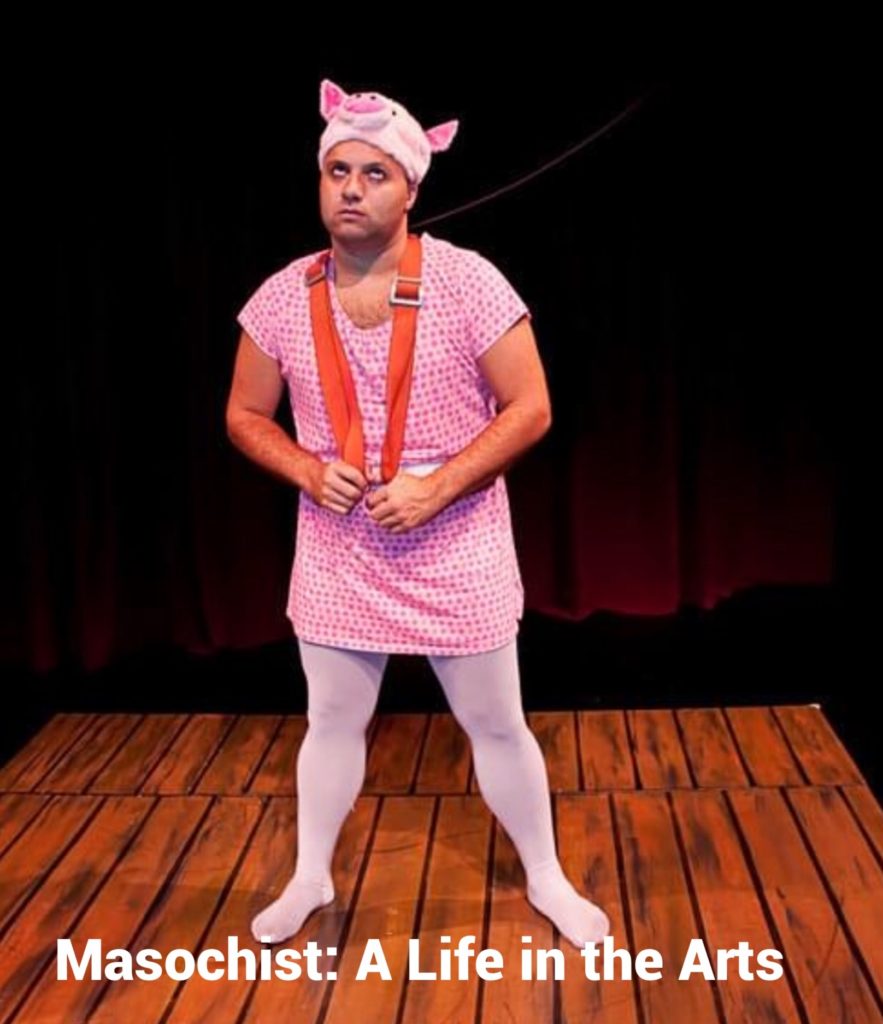By Jason Cooper
Entire contents are copyright © 2020 by Jason Cooper. All rights reserved.
7. Land Of The Lost
I decide to leave the theatre in Memphis when I was 29. I was burnt out on theatre, and I was having major “I’m about to be 30” anxiety. I decided to go home to re-group and make a plan. I was back less than a month, and I was losing my mind toiling at home with no outlet when I leaped at the chance to do a show at a resort in the Poconos. It was very bizarre and very much like Dirty Dancing. The talent, as we were called, stayed in this gorgeous cabin in the mountains and aside from performing in the show each night we were free to wander the Poconos during the day. Those were a surreal two months; we were so far removed from any town or city that I read about 900 books and went on many, many walks.
By the time I turned 30, I was at a real crossroads, but still, I could not bring myself to commit fully. I never went all in trying to make it as an actor. After tooling around NYC during audition season, I was reasonably sure that this was not the life for me. If you have never been to a New York City audition, I am here to tell you it is a dehumanizing experience. At every audition I went on, there was a sea of people indiscernible from each other. It was if they’d all been punched out by cookie cutters; they sang the same songs, wore the same clothes had the same headshots. I would think to myself, “What are you people doing?” Everyone thinks they are unique, that they have something special to give. This is true in life; it is not valid in show biz. Young actors hoping to make it big are a dime a dozen. The real chance of “making it” is only slightly lower than hitting the Powerball. The crazy thing is, we know this, but we persevere anyway. In New York, I had the delightful experience of being typed out for the first time. Typing out is a lovely method casting directors use to expedite the audition process. Basically, before you get the chance to stand and be judged by your audition, you get to line up to stand and be judged by your photograph. Only then do they decide if you get to audition or not — what a life-affirming experience.
I decided to relocate to Chicago. A friend from college was living there and needed a roommate. Chicago, as we know, is a vast theatre city. I came upon the notion that I was going to work in arts administration and do theatre on the side, as a hobby. Here’s a tip, if you want to act as a hobby, do not move to a city where there are thousands and thousands of actors trying to make a living. The Windy City is not a good town in which to be aimless, quite frankly there is too much alcohol. Many of my friends had also relocated to Chicago, so mainly I was there for two years of party time.
When I arrived, I was still pretty burned out, so I did not go on many auditions. Finding a job in arts administration proved almost as difficult as being an actor trying o get cast. I went on interview after interview, working at Barnes & Noble in Lincoln Square until I found something. Eventually, I did start going on auditions but other than some staged readings and being a featured soloist with The Chicago Gay Men’s Chorus; nothing panned out. Finally, after being there a year, I got a job as the Audience Relations Director at a Theatre on the North Shore. Since the theatre was not in the city proper a sixty-minute train commute was necessary. I did some research on the theatre and was pleased to discover it had received much acclaim in the past. I was excited; I thought this might be my future. It was, not at all. Yes, the theatre had much success and acclaim in the past, and that is precisely where they left it, in the past. When I was hired, the theatre was located in the picturesque town square of Highland Park, right on Lake Michigan. The first red flag waved in my face the first day, when I met my co-workers, they all seemed very anxious. It turns out the theatre was flat broke, within my first few months the staff of eight was shaved down to four, and we were tasked with one directive “get money.” Mainly my job was to try and get donors, bookings, subscribers, and single ticket buyers by hook or by crook.
There was some serious robbing Peter to pay Paul going on. I hated pretty much every second of it. After I had been there for about sixth months, we lost the lease on the theatre, and we were relocated to an abandoned firehouse the city leased to us for one dollar. Somehow, we were to put a positive spin on this to lure an audience. We realized quickly that the space we were using for offices had no heat and no A/C. This is Chicago, famous for sweltering summers and unbearable winters. Many mornings my co-worker “Bitter Cheryl” and I had to huddle on the floor next to the radiator to stay warm. I was pretty unhappy in Chicago, I was hardly going out on any auditions, I was not making any money, I was drinking too much, and I hated my job. One morning I was standing on the platform waiting for the train in the sub-zero temperatures, it was so cold I was wearing a freaking balaclava, and it still felt like knives hitting my face, and I said to myself “this is bullshit. I’m going home.”
Tomorrow’s chapter: Welcome to the Chicken Coop!

Jason Cooper has worked in professional, regional, and community theatre for over twenty years. After receiving his BFA in theatre performance he spent three seasons with the award-winning Playhouse on the Square in Memphis, TN. After working in theatres all over the country for a time, Jason settled in Chicago and worked with The Chicago Dramatists, Apple Tree Theatre, and Red Moon Theatre before returning home to Louisville to become a high school English teacher. Locally, Jason has worked extensively as an actor and director primarily for Pandora Productions, CenterStage, The Bard’s Town, Derby Dinner Playhouse, and Stage One.





